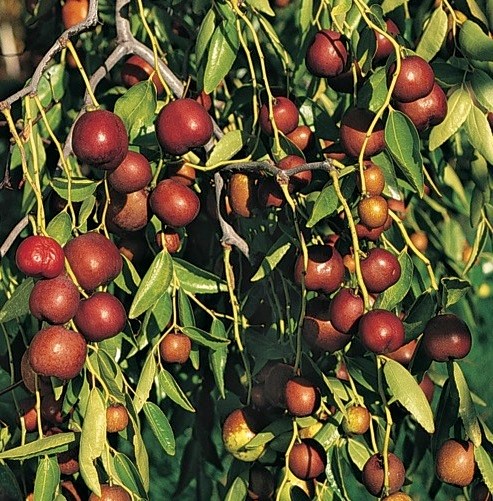1. Immune Support
Juices extracted from jujubes have demonstrated potential at inhibiting certain types of cancerous cells, including ovarian, cervical, breast, liver, colon and skin cancer cells.
One study in particular conducted in Iran tested the water extract of dried jujube fruit for possible anticancer effects and induction of apoptosis (automatic cell death) of human tumor cell lines. Using DNA fragmentation analysis, researchers found that ziziphus jujuba extract suppressed human tumor cell lines, especially a leukemia line.
Due to rich supply of antioxidants, overall, scientific studies show jujube’s impressive ability to help kill off tumor cells.
2. Insomnia Treatment
Jujubes and their seeds are used in Chinese medicine to treat common sleep troubles like insomnia. They contain compounds known as flavonoids, saponins and polysaccharides, which animal studies show gives jujube the ability to act as a natural sedative and has a soothing effect on the entire nervous system.
One study out of China found that saponins in ziziphus jujuba demonstrated an effective sedative and hypnotic function, which can be used to help sleep. Therefore, a cup of jujube tea before bed might be just the ticket to a restful night’s sleep and help treat insomnia without drugs.
3. General Gastrointestinal Benefits
Jujube fruit has traditionally been utilized as a puree, paste, tea or soup to improve digestion.
A study published in the Journal of Agricultural and Food Chemistry showed that an adequate consumption (defined as 40 milligrams per day) of jujube each day can improve the gastrointestinal environment and reduce the exposure of intestinal mucosa to toxic ammonia and other harmful compounds.
Is jujube fruit good for kidney patients? In certain studies, when adults consumed jujube extract daily, some experienced improved kidney function due to declining the levels of creatinine and urea, thereby limiting the risk for damage to the kidneys.
4. Help with Chronic Constipation Relief
A specific gastrointestinal benefit of jujube is relief from chronic constipation.
A study published in Digestion investigated the safety and efficacy of an extract of jujube on people with prolonged transit time, which is indicative of constipation. Subjects received liquid Z. jujuba or placebo for 12 weeks.
The study concluded that jujube extract may be an effective and safe treatment for chronic constipation because many people in the treatment group experience improvements in constipation symptoms, such as decreased transit time.
5. Supports Cognitive Health, Plus Uplifting and Calming
Jujubes are known for having a soothing effect on the mind and body. That’s exactly why they’ve been traditionally used as a natural antidepressant, anti-anxiety and anti-stress medicinal food. The seeds of the jujube fruit have been specifically implicated in reducing anxiety in animal subjects.
Results from one study published in the Journal of Ethnopharmacology suggest that jujube seed extract has anti-anxiety effects at a lower dose and sedative effects when used at a higher dose. Unfortunately, there are currently no human studies on the sedative or anxiety-reducing effects of jujube, but the animal research has been encouraging to date for jujube’s potential as a natural stress reliever.
Another potential benefit is supporting cognitive health. A 2017 study found that jujube possesses neuroprotective activities, including protecting neuronal cells against neurotoxin stress, stimulating neuronal differentiation, increasing expression of neurotrophic factors, and promoting memory and learning. This is due to its rich supply of antioxidants and anti-inflammatory compounds that defend against oxidative stress, which can damage the brain.
6. Rich in Disease-Fighting Antioxidants and Vitamin C
As both a high antioxidant food and vitamin C food, jujube consumption is an excellent way to increase your intake of key nutrients. Antioxidants are nutrients that block damage caused by free radicals.
Excessive levels of free radicals in the body are linked with an accelerated aging process as well as more serious health concerns, like cancer and heart disease.
Since our bodies can’t produce vitamin C on their own, it’s essential that we make sure we get enough vitamin C in our diets. Having just under a half cup of fresh jujubes fulfills over 100 percent of your daily vitamin C requirement. That’s a pretty easy and tasty way to fight free radical damage and stave of disease.
Vitamin C is also key to healthy skin and hair, while helping heal wounds and injuries to the body more quickly. Additionally, vitamin C and other compounds found within this fruit are thought to have natural antibacterial and antimicrobial effects.
7. Heart Support and Blood Pressure Helper
Jujube provides nutrients that have anti-inflammatory effects and that may help keep your blood pressure at healthy levels, including potassium, manganese and antioxidants.
Jujube’s manganese could potentially play a role in controlling blood pressure due to its anti-oxidative functions, while potassium is helpful for keeping the blood vessels relaxed, which promotes healthy blood flow.
Additionally, these fruits have historically been considered medicinal because they can help treat “blood deficiency.” Today, we know that dried fruits provide iron and other nutrients that can defend against anemia, fatigue, weakness and poor immune response.
The blood-nourishing functions of jujube, due in part to flavonoids, polysaccharides and triterpenoid, can generally help support a healthy cardiovascular system and metabolic functions.



